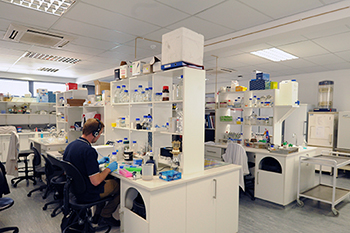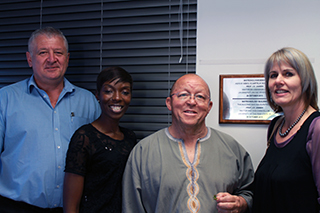Latest News Archive
Please select Category, Year, and then Month to display items
12 October 2020
|
Story Arina Engelbrecht
|
Photo Supplied
 Arina Engelbrecht from Organisational Development and Employee Well-being believes physical activity has a number of benefits for one’s health, including stress relief.
Arina Engelbrecht from Organisational Development and Employee Well-being believes physical activity has a number of benefits for one’s health, including stress relief.
Being physically active plays a big role in preventing the development of mental-health problems and in improving the quality of life of people experiencing mental-health problems.
Treatment for depression
Physical activity can be an alternative treatment for depression. It can be used as a stand-alone treatment or in combination with medication and/or psychological therapy. It promotes all kinds of changes in the brain, including neural growth, reduced inflammation, and new activity patterns are formed that promote feelings of calm and well-being. It releases endorphins – powerful chemicals in the brain that energise your spirit and make you feel good.
Physical activity can be very effective in relieving stress. Research in adults has found that physically active individuals tend to have lower stress levels compared to individuals who are less active. It also leads to improved sleep. When a person sleeps better and feels more rested, overall quality of life improves. They cope better with daily life stressors.
Reduce Alzheimer's risk
Regular physical activity can reduce your risk of developing Alzheimer's disease by up to 50%. It can also slow down further deterioration in those who have already started to develop cognitive problems. It stimulates the brain’s ability to maintain old connections as well as to make new ones.
A study asked people to rate their mood immediately after periods of physical activity (e.g. going for a walk/run, cycling, doing housework) and periods of inactivity (e.g. reading a book or watching television). Researchers found that participants felt more content, more awake, and calmer after being physically active compared to after periods of inactivity.
In conclusion, people who are physically active feel a sense of well-being, feel more energetic throughout the day, sleep better at night, have sharper memories, and feel more relaxed and positive about themselves and their lives.
“Being physically active not only changes your body, it changes your mind,
attitude, and your mood.” – Arina Engelbrecht
UFS launches expansions to Biotechnology Building
2015-11-04
 Biotechnology Building
Photo: Leonie Bolleurs |
To support the strategic focus of the University of the Free State (UFS) on teaching and learning in the field of Biotechnology, the Department of Microbial, Biochemical, and Food Biotechnology introduced upgrades and additions to the value of R23 million to the existing Biotechnology Building on its Bloemfontein Campus. The funding was provided by the Department of Higher Education and Training.
The new section, together with renovations to the existing part of the Biotechnology Building, was opened on Thursday 29 October 2015.
The Department, consisting of three disciplines - Microbiology, Biochemistry, and Food Biotechnology - is extremely diverse. Two of the three disciplines – Microbiology and Biochemistry – are housed in the Biotechnology Building.
Additions and renovations to the Biotechnology Building include:
- Four new research laboratories
- Nine revamped research laboratories
 At the launch of the Biotechnology Building were,
from the left: Nico Janse van Rensburg,
Senior Director: University Estates;
Maureen Khati, University Estates,
Prof Nicky Morgan, Vice Rector: Operations
and Ria Deysel, Director: Facilities Management.
Photo: Leonie Bolleurs
|
The work to the building will have dramatic effects on the quality, as well as the quantity, of postgraduate students. Given the national priority to deliver students, this is very important, particularly at the doctorate level.
Prof Koos Albertyn from the Department said these were the first renovations and expansions done to the building since 1 January 1990. “We welcome the extra space. Forty-six more postgraduate students can now be accommodated in the department,” he said.
Construction took place on the south-western corner of the existing building. Further developments to the building include:
- Six new offices
- A lecture hall for 70 students
- Laboratories that can accommodate 56 postgraduate students
Prof Martie Smit, Academic Head of the Department, said: “This new and refurbished facility enables us to give our best. As academics, we are committed to doing our part in delivering high-quality education at both undergraduate and postgraduate levels to students envisaging a future in biotechnology.”
The James Charles du Preez Seminar Room was also opened at the event. The seminar room is dedicated to Prof Du Preez – who was Head of the Department from October 2002 until the end of 2014. He played a major role in raising funds for upgrading the Biotechnology Building, including the addition of a new wing.